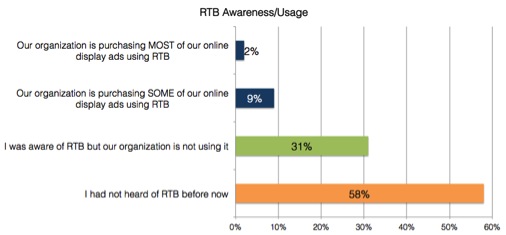Real-Time Bidding: a Marketer's Dream or Missed Opportunity?
By Jerry Rackley
Marketers have loved online display advertising from the moment it appeared on the stage as a marketing channel. There are plenty of reasons why we like it: the ability to better target an audience, its immediacy, the ability to measure performance and certainly the lower cost. As marketing communications channels go, it is a staple, particularly for digital marketers. Since its inception, advertisers have purchased online advertising much like they purchase traditional print advertising: select a media property, buy space and schedule the advertising to run. This is changing thanks to the introduction of exchanges for the programmatic buying of advertising impressions, more commonly known as Real-time bidding.
Real-time bidding (RTB) has emerged as an approach for buying and selling online advertising. While RTB isn’t new, the awareness of it is still relatively low, so it will seem new to many marketers. RTB uses an online exchange to allow advertisers to buy online advertising on demand, where it is then immediately served or displayed, virtually in real-time. The immediacy of online advertising has always appealed to marketers. When RTB enters the mix, that immediacy is almost instantaneous. The targeting of ads is also improved, because the platforms that support RTB don’t just randomly serve up ads online: advertisers have the opportunity to buy impressions for a specific audience across a broad spectrum of websites that have ad inventory to sell.
Demand Metric recently completed a research study about online advertising and RTB based on data collected through a survey. The survey participants identified the top benefit of online advertising as “targeted” – the ability to reach an audience with a specific set of characteristics. One of the key things marketers need to understand about RTB is that it excels at delivering a level of targeting precision beyond what online advertising already delivers. Ironically, this benefit is eluding most online advertisers at present, because awareness of RTB, along with an understanding of how it works, remains low. What is also known from the survey is that two-thirds of those who have a moderate to advanced understanding of RTB report that online campaigns that use RTB outperform those that don’t use it. There’s clearly a knowledge gap, and this ignorance of RTB is denying benefits to many who advertise online.
While it is true that many online advertisers are currently missing the potential benefits of RTB, RTB isn’t the ideal solution for everyone. However, it’s certainly a great solution for more companies than are currently using it. In the Demand Metric study, more than half of the participants reported that online display advertising was important or very important as an element of their marketing or lead generation plans. So it’s very clear that online display advertising is important, then consider that 89 percent of study participants either had never heard of RTB prior to the survey, or were aware of but not using it:
These figures reveal just how low the awareness and familiarity of RTB is. There is no doubt that some, perhaps most, of the companies that are in the dark about RTB are missing benefits they could gain from it.
If you leverage online display advertising to any extent, the smart move is to get educated on RTB. The RTB market is still emerging, which means that the vendors are primarily working to educate the market more than compete with each other. For this reason, there are a number of excellent resources, such as videos, whitepapers and case studies, to help advertisers learn more about RTB. It’s a relatively level playing field for vendors at present, and price has not yet become the major differentiator in their offerings. Some of the vendors that currently enjoy the most brand recall in the Demand Metric study include: AcuityAds, Appnexus, Chango, Dataxu, The Exchange Lab, RocketFuel and SiteScout.
The RTB vendors, at least for now, need to keep their focus on evangelizing their solution. While it is natural for vendors to compete with each other, given the low state of RTB awareness, vendors that do the best job of teaching, educating and being helpful about RTB and its benefits will gain in the long term. Focusing on competing with each other instead of helping educate the market is unproductive given the current maturity of the RTB market. Continuing to deliver helpful, quality content that is easy to find is the best path to success and establishing market share, as customers will reward vendors who help them the most with their business.



